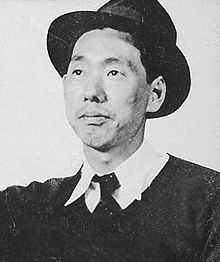Mikio Naruse
Mikio Naruse ( Japanese 成 瀬 巳 喜 男 Naruse Mikio ; born August 20, 1905 in Tokyo , Japan , † July 2, 1969 in Tokyo, Japan) was a Japanese director , writer and producer . Together with Yasujiro Ozu , Kenji Mizoguchi and Akira Kurosawa , he was the most famous Japanese director of his time.
biography
Naruse was born in Tokyo in 1905. He began his career in 1920 as an outfitter for the Shochiku film studios. Just one year after his promotion to assistant director in 1929, he made his first own film, Fukeiki Jidai . In 1933 he moved to another studio, which later became known under the name Toho .
In the 1930s he achieved increasing success at the box office. The critics were also kind to him. His film Tsuma yo Bara no Yo ni won the Kinema Junpo Film Award . Two years before his death, he finished his final film, Midaregumo , which is considered one of his best.
In 2007 the Munich Film Museum dedicated a retrospective to him.
Filmography
Mikio Naruse made a total of 89 films between 1930 and 1967:
- 1930: Mr and Mrs sword game (Chambara fūfu)
- 1930: Pure Love (Junjō)
- 1930: Hard times (Fukeiki jidai)
- 1930: love is strict (Ai wa chikara da)
- 1930: A recording of shameless newlyweds (Oshikiri shinkonki)
- 1931: Nē kōfun shicha iya yo
- 1931: Nikai no himei
- 1931: Little employee, hold on! (Koshiben gambare)
- 1931: Fickleness comes on the train (Uwaki wa kisha ni notte)
- 1931: The severity of a beard (Hige no chikara)
- 1931: Under the neighbour's roof (Tonari no yane no shita)
- 1932: Onna wa tamoto o goyōjin
- 1932: Aozora ni naku
- 1932: Be great! (Eraku nare)
- 1932: Mottiger Spring (Mushibameru haru)
- 1932: Chokorēto gāru
- 1932: Without blood ties (Nasanu naka)
- 1932: Kashi no aru Tōkyō no fūkei
- 1933: Separated from you (Kimi to wakarete)
- 1933: Dreams Every Night (Yogoto no yume)
- 1933: A man with a woman's hairstyle (Boku no marumage)
- 1933: Two eyes (Sōbō)
- 1934: Road without End (Kagiri naki hodō)
- 1935: Three sisters with a pure heart (Otome gokoro sannin shimai) , first sound film Naruses
- 1935: Joyū to shijin
- 1935: wife! Be like a rose! (Tsuma yo bara no yo ni)
- 1935: Sākasu gonin-gumi
- 1935: Uwasa no musume
- 1936: Tōchūken Kumoemon
- 1936: Kimi to yuku michi
- 1936: Three-Lane Street of the Morning (Asa no namikimichi)
- 1937: A Woman's Worries (Nyonin aishū)
- 1937: Avalanche (Nadare)
- 1937: Kafuku: Zempen
- 1937: Kafuku: Kōhen
- 1938: Tsuruhachi Tsurujirō
- 1939: The whole family works (Hataraku ikka)
- 1939: Sincerity (Magokoro)
- 1940: Traveling Actor (Tabi yakusha)
- 1941: A Face of the Past (Natsukashi no kao)
- 1941: Shanhai no tsuki
- 1941: Hideko the bus conductor (Hideko no shashō-san) , first of 17 films with Hideko Takamine , his favorite actress
- 1942: mother never dies (Haha wa shinazu)
- 1943: The song lantern (Uta andon)
- 1944: That Happy Life (Tanoshiki kana jinsei)
- 1944: The Path of Drama (Shibaidō)
- 1945: Until victory (Shōri no hi made)
- 1945: A story of archery in Sanjusangendo (Sanjūsangen-dō tōshiya monogatari)
- 1946: Urashima Tarō no kōei
- 1946: Both you and me (Ore mo omae mo)
- 1947: Yottsu no koi no monogatari , segment 2 "Wakare mo tanoshi"
- 1947: Spring awakens (Haru no mezame)
- 1949: criminal girl (Furyō shōjo)
- 1950: Prof. Ishinaka's behavior report (Ishinaka sensei gyōjōki)
- 1950: Evil Street (Ikari no machi)
- 1950: White Beast (Shiroi yajū)
- 1950: Eaten bara
- 1951: Ginza cosmetics (Ginza geshō)
- 1951: Dancing Girl (Maihime)
- 1951: The meal (Meshi)
- 1952: Okuni and Gohei (Okuni to Gohei)
- 1952: mother (Okāsan)
- 1952: Lightning (Inazuma)
- 1953: married couple (Fūfu)
- 1953: wife (Tsuma)
- 1953: older brother, younger sister (Ani imōto)
- 1954: Music of the Mountain (Yama no oto)
- 1954: Late Chrysanthemums (Bangiku)
- 1955: Driving clouds (Ukigumo)
- 1955: The Kiss, Part 3: Women's Ways ( Kuchizuke , segment 3 "Onna dōshi")
- 1956: downpour (Shūu)
- 1956: Heart of a Woman (Tsuma no kokoro)
- 1956: Flow (Nagareru)
- 1957: Wild Woman (Arakure)
- 1958: Anzukko
- 1958: Herringbone Clouds (Iwashigumo) , first cinemascope and color film by Naruse
- 1959: Whispers in Kotan (Kotan no kuchibue)
- 1960: When a woman goes up the stairs (Onna ga kaidan o agaru toki)
- 1960: daughter, wife, mother (Musume tsuma haha)
- 1960: Evening Current (Yoru no nagare)
- 1960: Autumn is approaching (Aki tachinu)
- 1961: Like the wife, like the wife (Tsuma to shite onna to shite)
- 1962: The Clever Age (Onna no za)
- 1962: Notes of my vagabonding (Hōrōki)
- 1963: A Woman's Life (Onna no rekishi)
- 1964: Confusion (Midareru)
- 1966: The stranger in the woman (Onna no naka ni iru tanin)
- 1966: hit and run (Hikinige)
- 1967: Torn Clouds (Midaregumo aka Zwei im Schatten)
Web links
- Mikio Naruse in the Internet Movie Database (English)
- Senses of Cinema: Great Directors Critical Database
- Rediscovering an Asian master
- The materialist ethic of Mikio Naruse
- Strictly Film School reviews
- Slant Magazine: Feature on Mikio Naruse by Keith Uhlich
| personal data | |
|---|---|
| SURNAME | Naruse, Mikio |
| ALTERNATIVE NAMES | 成 瀬 巳 喜 男 (Japanese) |
| BRIEF DESCRIPTION | Japanese director |
| DATE OF BIRTH | August 20, 1905 |
| PLACE OF BIRTH | Tokyo , Japan |
| DATE OF DEATH | 2nd July 1969 |
| Place of death | Tokyo , Japan |
